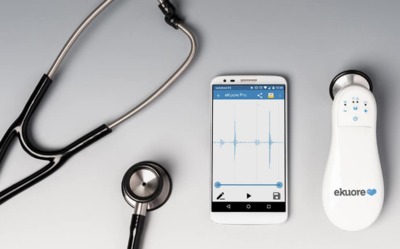Ekuore Digital Stethoscope Review
eKuore Veterinary Stethoscope – A Student Perspective
WikiVet has always been a valuable resource as a veterinary student and something I have personally relied on to help revise anatomy or clarify concepts. WikiVet Live was a fantastic event allowing veterinary students from all over the world to access relevant talks on topics that all students will eventually face when they graduate. I was able to access the central time zone stream where I benefitted from topics ranging from nutrition to interacting with clients; and even spotted some familiar faces of vet students giving talks on topics such a travelling abroad as a vet student. As an added bonus after entering a WikiVet Live competition, I was lucky enough to win a eKuore electronic stethoscope.
The stethoscope delivers a high quality sound in order to carry out a detailed cardiothoracic exam. I have so far been able to utilise it in cats, dogs and horses but it has also proved to be very useful for rabbit and guinea pig auscultation. Identifying clear heart sounds in these smaller species is something I had struggled with previously. However, eKuore Vet electronic veterinary stethoscope amplifies the auscultation sounds by a factor of twenty, meaning I was able to identify respiratory and cardiac sounds quicker and auscultate any abnormalities with improved accuracy. I would like to use this feature in other exotic species as I have never been able to significantly auscultate heartbeats in a reptile – something which the eKuore has been famed in testimonials to do!
Still, the most useful tool I have found by far is the free app that connects with the stethoscope via Bluetooth. The app can record heart and lung sounds and produce a visual representation of a heartbeat that is able to be accessed on a phone or tablet. It is a brilliant teaching aid and I have used it to great effect with other students for difficult murmurs or arrhythmias and even with owners, who seem to really appreciate having a higher level of understanding of their pet’s condition. Traditionally auscultation is performed solo and unlike other diagnostic modalities such as imaging where pathology can easily be pointed out by a clinician, auscultation can be frustrating to communicate. I have previously experienced difficulties in explaining what I am hearing or understanding clinicians’ explanations of heart sounds. The eKuore stethoscope and app can make this whole process much clearer and even an interactive group learning experience. I hope to continue to use the app in first opinion practice to build up a digital library of heart sounds which I am able to refer to for a range of species and compare to physiological and pathological conditions. These records can also be used when seeking a second opinion or to effectively communicate with colleagues. Overall, I would highly recommend the eKuore veterinary stethoscope especially to those working in teaching environments.
Review by Emma King a final year student at the University of Liverpool, UK who won the stethoscope in a WikiVet LIVE! 2018 prize giveaway.
